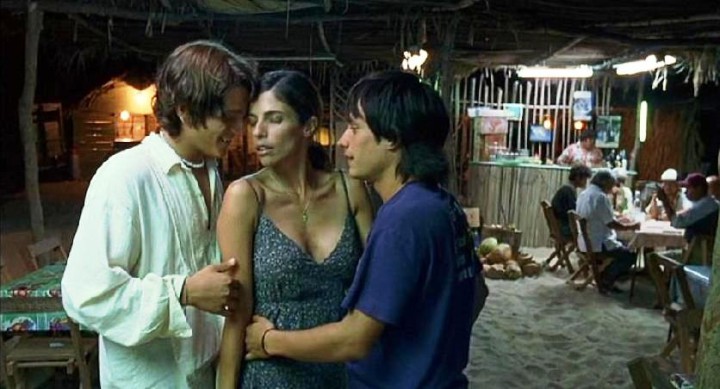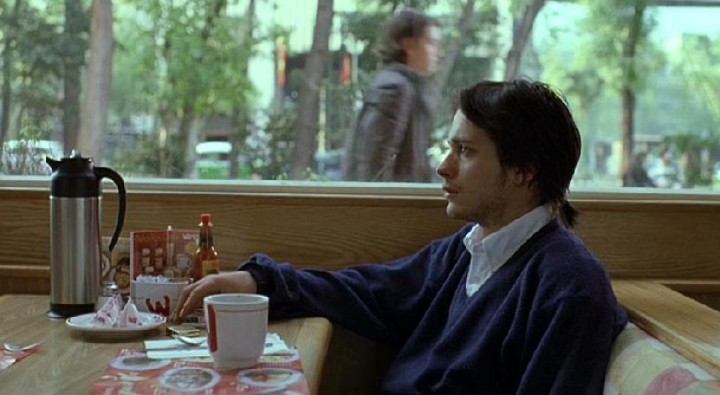In many ways, it can also be seen as a more sexually frank take on Truffaut’s Jules and Jim. Julio (Gael Garcia Bernal) and Tenoch (Diego Luna) are two close friends whose girlfriends are away for the summer on a trip to Italy. Their lives are marvelously unstructured. They spend their time drinking, doping, hoping to “get lucky” (it rarely happens) and kvetching about what they want to do with their lives versus what their parents want them to do. All this changes when they meet Luisa (Maribel Verdu), Tenoch’s distant cousin by marriage, at a wedding. Engaging in the adolescent fantasy of the two of them running off with this lovely woman, they propose to take her to see a legendary (possibly non-existent) beach. She laughs the idea off until she finds that her husband has been cheating on her, whereupon she agrees to go with them. Since they never expected her to accept, the boys have to pull the trip together at the last moment.
At this point, Y Tu Mama Tambien transforms itself into not only a journey to find this mythical beach, but a journey into the selves of the three characters — and into the heart of Mexico. Original? As an idea, not in the least. As developed, however, it’s better than original: It’s truthful. Are these characters going to learn truths about each other? Is the sexual tension between them going to erupt into something? Will this trip leave the three of them completely different than they were at the beginning? Of course, all these things will happen, but they don’t happen in the ways Hollywood has taught us to expect. Instead, they happen much more in the way of real life.
The resulting discoveries aren’t neatly packaged and they don’t shy away from things Hollywood either pretends don’t exist in the hopes they’ll just go away, or else touches so tentatively that if you blink you’ll miss it. (Compare the intense homoerotic subtext in this film with the supposed homoerotic text of Murder by Numbers.) While Y Tu Mama Tambien is utterly sexual in terms of nudity and content and dialogue (it’s the most blatantly erotic film in ages), it primarily uses this sexuality as an exploration of the growth of the characters and the nature of bonding — and the ultimate sadness that can come with self-realization. It’s a quietly shattering film that left me in mind of Gertrude Stein’s matter-of-factly disheartening sentence, “Little by little we never met again” — while at the same time being life-affirming in its wholehearted embracing of the characters and their humanity. It’s a movie that’s apt to offend some and make others uncomfortable. It’s also a movie that needs to be seen.
Classic World Cinema by Courtyard Gallery will present Y Tu Mamá También Friday, Sept. 25 at 8 p.m. at Phil Mechanic Studios, 109 Roberts St., River Arts District (upstairs in the Railroad Library). Info: 273-3332, www.ashevillecourtyard.com







Before you comment
The comments section is here to provide a platform for civil dialogue on the issues we face together as a local community. Xpress is committed to offering this platform for all voices, but when the tone of the discussion gets nasty or strays off topic, we believe many people choose not to participate. Xpress editors are determined to moderate comments to ensure a constructive interchange is maintained. All comments judged not to be in keeping with the spirit of civil discourse will be removed and repeat violators will be banned. See here for our terms of service. Thank you for being part of this effort to promote respectful discussion.